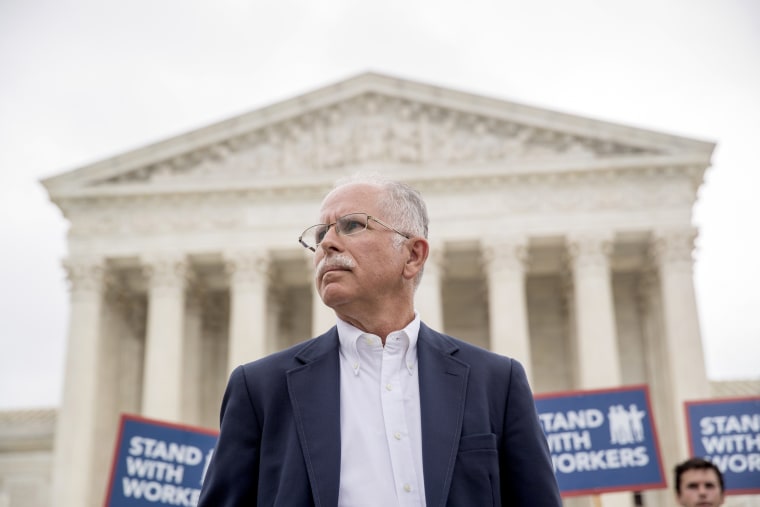The retirement of Justice Anthony Kennedy coupled with the court’s ruling against public sector unions in Janus v. American Federation of State, County, and Municipal Employees, Council 31 will certainly have far-reaching implications for American life. But, perhaps most importantly, the two developments mean that, far from being a tool for the “poorly financed causes of little people,” the First Amendment will increasingly be available primarily to those advancing conservative and business causes in the Supreme Court.
The Janus decision, which said that public employees have a First Amendment right to refuse to pay money to their union, reversed a forty-year-old precedent and removed from public employers a stable and effective method of managing their workforces. But it was carefully crafted to avoid expanding free speech rights for public employees more generally, making it the latest example of the conservative Supreme Court majority privileging some speakers and types of speech over others.
What was technically at issue in Janus was whether unions representing state employees (and required by law to represent every public employee in a bargaining unit regardless of whether they belong to the union) could solve the free rider problem by agreeing that each represented public employee could be required to pay for the costs of representation. In a 1977 case, Abood v. Detroit Board of Education, the Supreme Court held that, for those workers who might object to supporting a union, the unions could charge partial dues but not charge for the costs of their activities that did not relate to collective bargaining, including lobbying or participating in electoral politics.
This is the latest example of the conservative Supreme Court majority privileging some speakers and types of speech over others.
In Janus, the court rejected that longstanding compromise, deciding that it was not sufficiently protective of employees who object to their union. That outcome obviously benefits objectors and harms public sector unions in the approximately 22 states that allowed unions to collect such fees from non-union members.
But it also harms public sector employees who do want to be union members: After this decision, they will see more of their dues go towards subsidizing their co-workers who make the economically rational decision to free ride. Janus has essentially imposed a surcharge on workers who want their union to be their voice in the political realm, in order to protect workers who do not want to pay for collective bargaining.
There was a potential silver lining: One might expect that a decision expanding the First Amendment rights of public employees in the union context might carry over into other contexts too. But no – the Janus majority shaped its opinion to avoid that outcome, writing that public employees have greater First Amendment protections when a collective demand is on the table than when a single employee tries to speak for him or herself.
If the court’s solicitude toward the collective First Amendment rights of public employees were genuine, then one could expect that it would help those who band together to demand better treatment.
So, for instance, if a public employer finds it expedient to dismiss a single employee who has repeatedly asked for a raise, that employee should not attempt to find refuge in the First Amendment. (In fact, in a 2011 case, Justice Kennedy had rejected the claim of a public employee who was fired after filing a grievance over $338 in overtime, writing that public employees’ First Amendment rights must yield to “efficient and effective operation of the government.”)
Furthermore, if the court’s solicitude toward the collective First Amendment rights of public employees were genuine, then one could expect that it would help those who band together to demand better treatment -- like the West Virginia teachers who went out on strike earlier this spring. But that too is doubtful, even to dissenters on the court: As Justice Kagan put it in her dissent, “either the majority is exposing government entities across the country to increased First Amendment litigation and liability... Or else, when actual cases of this kind come around, we will discover that today’s majority has crafted a “unions only” carve-out to our employee-speech law.” It doesn’t take a crystal ball to predict which it will be.
This isn’t even the first time during this session in which the court seemed to protect some political viewpoints over others. Janus followed directly on the heels of NIFLA v. Becerra, in which the court struck down California’s requirement that so-called crisis pregnancy centers post notices either informing pregnant women that low-cost health care services, including abortions, are available at other facilities or declaring that the facility was not licensed to provide medical services at all.
This isn’t even the first time during this session in which the court seemed to protect some political viewpoints over others.
The same 5-4 majority as in Janus struck down those requirements under the First Amendment, with Justice Kennedy implying in a concurrence that California’s law was the hallmark of a “relentless authoritarian regime.” But anyone hoping that the crisis pregnancy center decision might also be used to strike down red-state laws requiring that physicians performing abortion read their patients a list of (often non-scientific) warnings was disappointed: “Informed consent requirements,” the court wrote, are conduct, not speech.
Kennedy’s impending retirement means that President Trump will soon appoint a replacement, who will likely be confirmed by the Senate on a party-line vote. And once seated, that justice will almost certainly prove more judicially conservative than Kennedy – which seems to mean that the First Amendment will increasingly be a more useful tool for conservative speakers than liberal ones.
Charlotte Garden is an associate professor at Seattle University School of Law. She co-authored an amicus brief in support of the state and union respondents in Janus v. AFSCME.
